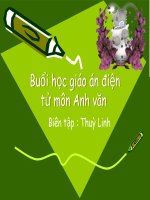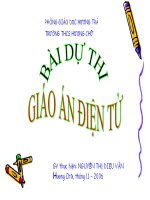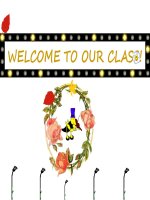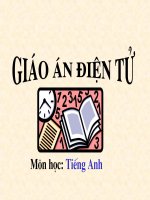Unit 4: OUR PAST ( Lesson 1 & 2...)
Bạn đang xem bản rút gọn của tài liệu. Xem và tải ngay bản đầy đủ của tài liệu tại đây (4.19 MB, 15 trang )
Welcome to our class today
Grade 8- Ninh Xa secondary school
Unit 4: Our Past
Unit 4: Our Past
Lesson 1: getting started
Lesson 1: getting started
listen and read
listen and read
The TV
The radio/ stereo
The mobile phone
Modern clothes/ long dress
The lighting fixtures
School uniforms
T/F statement prediction
F
T
F
T
F
1.
2.
3.
4.
Nga used to live on the farm.
Nga’s grandma didn’t go to school.
She has an easy life when she was young.
There wasn’t any modern equipment at
her time.
5. “ The lost shoe” is a short story.
Discuss the questions
a. Where did Nga’s grandmother use to live?
Nga’s grandma used to live on the farm.
b. Why didn’t she go to school?
Because she had to stay home and help her mom, look
after her sisters and brothers
c. What did Nga’s great-grandma use to do?
She used to cook the meals, clean the house and wash the
clothes.
d. What did Nga’s great-grandma & grandfather do
after dinner?
Great-grandma lit the lamp and great grandfather used to tell
stories.
e. What did Nga ask her grandma to do at the
end of the conversation?
Nga asked her grandma to tell her the tale.
Fact or opinion
a. I used to live on a farm. F
b. There wasn’t any electricity. F
c. Mom had to do everything without
the help of modern equipment. F
d. My father used to tell us stories. F
e. The best one was “ The lost shoe.” O
f. Traditional stories are great. O
Did you use to ...................
• Get up late?
• Ride bike too fast?
S + used to + V-inf
• Go to school late?
doesn’t exist any more.
• Eat too much candy?
• Forget to do homework?
• .............................................
past habit,
Welcome to our class today
Grade 8- Ninh Xa secondary school
Unit 4: Our Past
Unit 4: Our Past
Lesson 2: Speak and listen
Lesson 2: Speak and listen
##**##
##**##
Eg: She used to live on a farm when
she was young.
Is she young now?
Where did she live ?
Does she live in a farm now?
S + used to + V-inf
showing past habits or something that often happened in
the past but now it stops.
S + didn’t use to + V-inf
Did + S + use to + V-inf ?
Eg: I used to walk to school but now I go to school by bike.
He used to get up early, now he gets up late.
Make sentences with
these cues.
• I/ live/ Hue/ Ha Noi.
• She/ long hair/ short hair.
• Ha/ study/ morning/ afternoon.
Look at the two pictures and
find out the differences
No electricity
Small houses
buildings
Relax/ watch TV
Work hard all day
Stay at home
Go to the
market
Walk
Go by cars/
motor
The people used to live in small houses,
The people used to live in small houses,
but now they live in buildings.
but now they live in buildings.
Go to the
supermarket
Go to school
Now, talk about YOU
• What did you do in the past?
• What do you do now?
Listen to a story.
Choose the most suitable moral lesson.
A.
B.
C.
D.
Don’t kill chickens.
Don’t be foolish and greedy.
Be happy with what you have.
It’s difficult to find gold.
•
•
•
•
The Lost Shoe
Once a poor famer had a daughter named Little Pea. After his wife
died, the farmer married again. His new wife had a daughter, Stout
Nut. Unfortunately, the new wife was very cruel to Little Pea. Little
Pea had to do chores all day. This made Little Pea’s father very upset.
He soon died of a broken heart.
Summer came and went. In the Fall, the village held its harvest
festival. That year, everyone was excited as the prince wanted to
choose his wife from the village. Stout Nut’s mother make new clothes
for her, but poor Little Pea had none. However, before the festival
started, a fairy appeared and magically changed Little Pea’s rags into
beautiful clothes.
As Litlle Pea was running to the festival, she dropped one of her shoes
and lost it. When the price found the shoe, he decided to marry the girl
who owned it. Of couse the shoe fitted Little Pea, and the price
immediately fell in love with her. Now they are still living happily with
lots of children.









